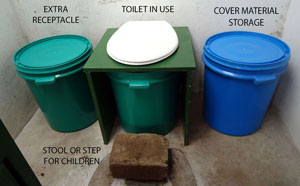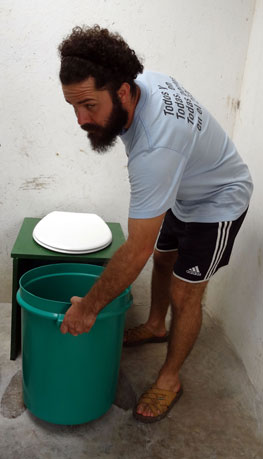Three Elements of a Compost Toilet System

(1) THE TOILET; (2) THE COVER MATERIAL; (3) THE COMPOST BINS
Always keep the toilet contents covered. If you’re using an adequate amount of appropriate cover material, your loo will be odor-free, as will your compost bin. If your nose picks up bad odors, or your eyes see flies, you’re not keeping the compost covered correctly. You need a nose that works and eyeballs that work to be able to manage a compost toilet system. A brain that works helps, too. A compost toilet is “the thinking person’s toilet.” Add more cover material if you smell anything. Make sure it’s fine enough and has residual moisture when covering your toilet contents. If it’s light and fluffy and dry like bagged wood shavings, it will not be as effective an odor blocker in your toilet, and you will need to use more of it, filling your loo receptacle too rapidly. Wet it down, and let it rot, even for years if needed; then use it for covering the toilet contents.
Cover Material is Needed
Good cover materials for an outdoor compost pile include weeds, straw, hay, leaves, grass, and other materials that can be bulky, dry, or green, but not woody, such as tree branches. Adequately covering compost with a clean organic material is the simple secret to odor prevention. It also keeps flies and other vermin off the compost. Adequate cover material insulates the pile, absorbs rainfall, and prevents dehydration. Dehydration will cause the compost microorganisms to stop working.
Compost kills human disease organisms (pathogens). This is well-established science, and very important. This is what makes composting such a valuable endeavor, especially the composting of humanure and other organic materials that are potential carriers of pathogens.
